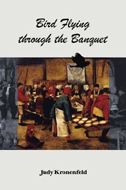 Judy Kronenfeld
Judy Kronenfeld
Bird Flying through the Banquet
FutureCyclePress
Reviewer: Ann Wehrman
Upon reading and rereading Judy Kronenfeld’s 2017 collection, Bird Flying through the Banquet, as a Western female poet writing today, I recognized more than an esteemed colleague. Kronenfeld’s poems, in their deep centeredness, stillness, and fearless reach, reveal a teacher and a pioneer. At first read, Kronenfeld’s poems quickly convey the wholesomeness of just-baked dark bread or apple cake cooling on the table, of clean cotton sheets, of someone to brush the hair out of one’s eyes and reassure one that it’s all going to be all right. In “Bread,” she writes,
Even the packaged kind—
twisty tie untwisted—
sends up its yeasty plume
to the nose, its celebration
of morning hunger…
and I think of truckers in a diner,
knuckles greasy, gathering up
the creamy yolks with a crust,
before each climbs alone into his cab…
Despite the poems’ accessible language, familiar images, and natural balance, Kronenfeld is not writing greeting card verse to reassure the masses. The poems seek less to reassure than to challenge, as Kronenfeld plumbs new experiences, regardless of risk, and distills profound understanding. Though palpable feelings of goodness and strength radiate from her work, they are merely the fur cloak in which her deeper intentions and implications are wrapped. Kronenfeld takes flight within, grounded in her stable base, and reaches for new truth—that truth is the substance of her poetry. Standing innately strong within that magic circle of protection, Kronenfeld ranges far, writing of family, love, community, ritual, old age, and death with laser-sharp perception, humor, and insight.
In “Malaise,” Kronenfeld yearns for more in life, to move beyond the routine that soothes and numbs,
What we want when the days
begin to pile up against us—though we mumble
only about work not going well,
about a blister on a heel, and our friends
or lovers sigh, “Tell me what you want me
to say”—is instinctive enlightenment
megawatts beyond our own—
a rush of it, revelation opening
like the first-seen broad avenues
of a famous city from the heights.
What we want is not laboriously folded
origami birds made according
to instruction—however clever.
We want wild parrots feathered chartreuse,
scarlet, cyan, bursting from their jungle cover,
carrying astonishing messages
in their beaks.
At the risk of stating a cliché, it’s what’s on the inside that matters. We humans live both on the inside and outside. Outside, in the world of the senses, there are exciting realms to experience and explore. However, without reflecting, contemplating, and eventually understanding all that we experience in the outside world, we remain the eternal child, the Fool, unable to look ahead with sagacity, and as a result, liable to err repeatedly.
Over centuries, much experimental poetry, challenging in both subject and form, has been written by people of diverse genders and lifestyles. Poets, after all, seek the truth in order that their art may convey real substance. Truth-seeking can be demanding and take one far from convention. The poet’s task is to internalize the truth he or she discovers, and to express that understanding in words used as offerings to whatever that poet holds most dearly. In “Rothko Dark,” for example, one marvels at the poet’s softly expressed courage:
like the quiet pool
where I swam, alone,
in a hotel at dusk
in a Northern country,
a somber pool in a barely lit
room, low windows looking out
on the ink sea almost
filling them, a sea
of banked black fire, like the inside
of my eyes, dull sheen
flushed here and there
with the ghost purpling
of an unseen sun—
or my own long looking…
as if—even when immersed
in the soul’s darkest
hours—giving one’s self
to darkness
faintly lightens it.
Reading those words, I felt like Frodo Baggins might have felt at the edge of Mordor. The dread is palpable as one faces walking through shadows—be they spiritual, physical, or both—while bearing the light. The poem’s truth fits many variations of darkness, from one’s inner soul to the world today, in which human beings struggle for our lives and our world, hopefully to see and follow the light, away from war, hatred, prejudice—the dark realms of the soul.
The wisdom traditions all require one to develop a deeply-focused inner life. Even poetry, to have power, requires the ultimate unveiling, the revelation of internal meaning. That is what gives great poetry its delicious twist, beyond the very real pleasures of rhyme and rhythm, when the reader realizes that the entire poem up to now has been a method of scrying, a spell made of language. In “The Older Generation,” Kronenfeld shares insight on that group of people using extended metaphor:
At first, amidst the blur of tentative
green about to swarm,
these trees seem hung with flags
of creamy bloom. Close up,
it’s clear those flags
are ash leaves—hung on through
the winter—trembling in the wind
and hanging on,
some curled tightly inwards—
empty dry cocoons, coquilles,
crustacean shells I think I hear
faintly clicking—
some blanched white
as ghosts, bone white, newly translucent—
their veins the color of ink faded
to brown in scraps
of ancient manuscripts.
The imagery and language in the poem do justice to the whisper-delicate, aged bodies in which spirits, intellects, and hearts burn brightly.
As a teen just beginning to write poetry, I devoured twentieth-century female poets’ work and dreamed of one day writing like them—Judy Kronenfeld would have been a model teacher for me then and is now. My hope is that current and future generations will similarly appreciate Kronenfeld’s powerful poems of deep roots and soaring inner quests.

